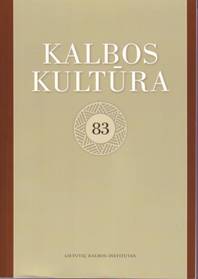Konstancija ir Jonas Jablonskiai
The family of Konstancija and Jonas Jablonskiai
Author(s): Eglė Lukėnaitė-GriciuvienėSubject(s): Baltic Languages, 19th Century, Pre-WW I & WW I (1900 -1919)
Published by: Lietuvių Kalbos Institutas
Keywords: Jonas Jablonskis;
Summary/Abstract: Jonas Jablonskis was born on 30 December 1860 in Kubilėliai near Naumiestis. Besides their eldest son Jonas, Agnieška and Juozapas Jablonskiai had another three children: Antanas, Jurgis and Marytė. Soon after Jonas’ birth, the family moved to Rygiškiai.Jonas Jablonskis attended the Naumiestis elementary school, then continued his schooling in the Marijampolė gymnasium which he finished in 1881 with distinction and was awarded a gold medal. His interest in languages encouraged him to choose Classical Philology for studies at the University of Moscow. Professors Fiodor Korsh and Filip Fortunatov had a major influence on Jablonskis’ growing interest in his native Lithuanian language. In 1885, J. Jablonskis graduated from the university but it took him another four years to get a teacher’s position in the Mintauja boys’ gymnasium where he started teaching ancient languages.In 1890 Jonas Jablonskis, a Catholic, married a very well-educated Konstancija Sketerytė who belonged to the Reformed Church. Their first children were born in Mintauja: son Konstantinas (1892) and two daughters, Ona (1894) and Julija (1896). The other two sons, Vytautas (1899) and Jonas (1906), were born in other places to which the family moved from Mintauja.J. Jablonskis was extensively writing on language. His articles were published in the Varpas and the liberal Russian press. The Jablonskis’ family home was frequented by the activists of the Lithuanian intelligentsia who shared a common future vision of their motherland. In 1896, teacher J. Jablonskis was transfered to Revel (currently Tallinn) which was far away from Lithuania and the ideas of freedom. The Jablonskis family could only visit their homeland during summers.In 1900, J. Jablonskis completed one of his most significant works, Lietuviškos kalbos gramatika (Grammar of the Lithuanian Language), which came out in 1901. Yet soon after this he was trialed and charged in a notorious case related to the violation of the Lithuanian press ban. As a consequence, in 1902 Jablonskis was deported to Pskov in Russia. Upon his return, Jablonskis lived in Šiauliai (1903–1904), Vilnius (1904–1906), taught part-time in the Panevėžys teachers’ seminary (1906–1908). His second major work, Lietuvių kalbos sintaksė (Syntax of the Lithuanian Language), came out in 1911 and a year later Rašomosios kalbos dalykai (On the Written Language) appeared.When two Lithuanian gymnasia in Voronezh for war immigrants were opened in 1915, J. Jablonskis was officially invited to teach Lithuanian. It was during this period that he prepared and published a reader in Lithuanian titled Vargo mokyklai (1916), a textbook in mathematics Aritmetika. Mokslo pradžia ir terminai (1917) and a dictionary titled Mūsų žodynėlis (1918). 1918 saw the return of the whole Lithuanian colony, the Jablonskis family included, from Russia to Lithuania. In Vilnius, J. Jablonskis published Lietuvių kalbos gramatika (The Grammar of Lithuanian) (1919). When Vilnius was occupied by Poland, the family moved to Kaunas.J. Jablonskis’ health was getting weaker, he could hardly walk and sometimes could not even write. As a sign of recognition, the linguist was awarded the title of professor and honorary member of the University of Kaunas, which was established in 1922. During the last ten years of his life he intensely worked and published the following books: Lietuvių kalbos gramatika (1922), Lietuvių kalbos vadovėlis (A Textbook of Lithuanian) (1925), Linksniai ir prielinksniai (Cases and Prepositions) (1928). He also prepared 234 articles on language which were dictatedto his wife, son or students.In February 1930, Jonas Jablonskis got the flu and died in hospital on 23 February.
Journal: Bendrinė kalba (iki 2014 metų – Kalbos kultūra)
- Issue Year: 2010
- Issue No: 83
- Page Range: 9-18
- Page Count: 10
- Language: Lithuanian

